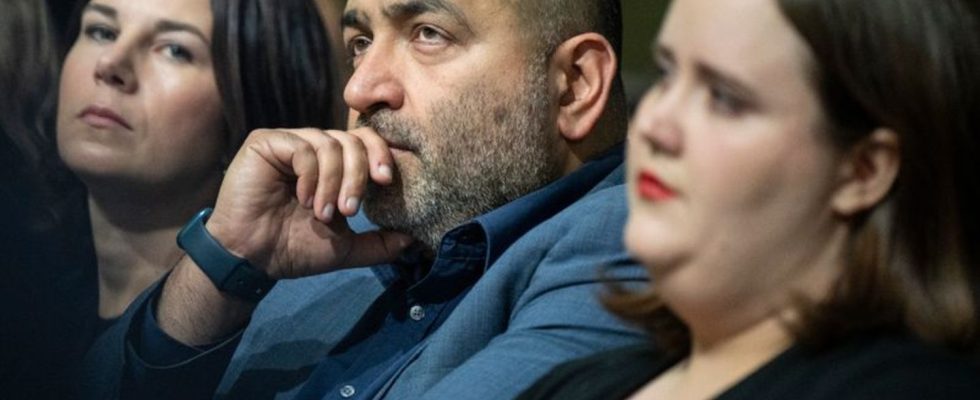Many Greens were deeply outraged that their own top personnel also agreed to the planned tightening of EU asylum law. At the small party conference, the tone is surprisingly forgiving.
At a small party conference, the Greens laid down their route for further European negotiations on EU asylum law. A clear majority of the approximately 100 delegates in Bad Vilbel, Hesse, supported a motion by the Federal Executive Committee on asylum policy, in which, however, numerous changes by critics of the decision by the EU interior ministers had previously been integrated.
For example, families with children should generally not be involved in fast-track asylum procedures at the EU’s external borders. EU states should not be obliged to carry out such border procedures.
What are the reform plans about?
On June 8, the EU interior ministers decided on plans for far-reaching asylum reforms with German approval – and thus also with the approval of top Greens. Numerous tightening measures are planned to limit irregular migration – especially from countries that are considered relatively safe.
Asylum applications from migrants who come from countries of origin with a recognition rate of less than 20 percent are to be examined within twelve weeks at the EU’s external borders. During this time, they want to oblige those seeking protection to stay in strictly controlled reception facilities. Those who have no chance of asylum should be sent back immediately. It is conceivable that the EU Parliament will push through changes. It has a say in the reform.
The EU Parliament will negotiate the plans with representatives of the EU states in the coming months and is likely to push through changes. In the end, the federal government would also have to position itself on the result.
Greens want to fight for their positions
“We want effective human rights monitoring at the external borders and a binding distribution in the member states,” says the decision made by the Green Party delegates at their state council in Hesse. “We will fight for this in close coordination between the European parliamentary group, parliamentary group, federal party and members of the government. We will also evaluate the result together.” How you position yourself in the end will depend on “whether the bottom line is that there are improvements in European asylum policy and also for Europe”.
A more extensive application by the Green Youth, which would have made final German approval dependent on “substantial improvements” for those affected, did not find a majority. The youth organization had explained, among other things, that there should be no obligation to external border procedures. Co-boss Timon Dzienus was nevertheless satisfied. The Green Youth were able to assert themselves with their criticism on central points, he said. “The party has taken courage to work for improvements for the people on the external borders.” MEP Rasmus Andresen also summed it up: “We Greens have decided to clearly criticize the EU interior ministers’ tightening of the asylum law.”
Struggle for a compromise on asylum
The delegates discussed intensively, but without personal attacks. Foreign Minister Annalena Baerbock defended her approval of the decision and tried to explain her considerations. “It tore me up too,” she said. After all, an agreement has now been found that would mean a better distribution of those seeking protection in Europe. “We have a small improvement compared to the status quo,” Baerbock said.
In an emotional, highly acclaimed speech, Schleswig-Holstein’s Integration Minister, Aminata Touré, turned against the reform plans that Federal Interior Minister Nancy Faeser (SPD) had negotiated with her European counterparts. The decision to agree here was wrong, she said, “it hurts me, it disappoints me”. Struggling for composure, she said it was about people, “people like my family 30 years ago”. Touré’s parents fled to Germany after a putsch in West African Mali.
The federal government, represented by Faeser, had campaigned in the negotiations for families with children to be exempted from the so-called border procedures. In order not to jeopardize the agreement, however, she ultimately had to accept that this could be possible.
“Have confidence in our leadership”
Critics of this agreement also tried to separate the criticism of the matter from the people involved. Green MEP Erik Marquardt emphasized: “We all have confidence in our leadership.” But you have to be realistic. The Greens do not currently determine the debate. At the European external borders, people would be systematically disenfranchised.
Party leader Omid Nouripour said that the current situation in the states on the EU’s external borders is without humanity and without order, and that this has to change. Nouripour also referred to his own past as a refugee from Iran. He appealed to the delegates: “Let’s fight today and then we’ll go out together, arm in arm and fight for what’s right!”
Reconciled for the moment
Federal Economics Minister Robert Habeck had previously tried to give the party courage in difficult times. “There is pressure on us from all sides,” said the Vice Chancellor. “So many changes, they raise questions, criticism and sometimes protest.” Habeck admitted: “Changes are applauded at party conferences, but they are often unreasonable.”
For the moment, the party is reconciled with itself. However, asylum policy will catch up with the Greens again when further negotiations at European level get going – and the federal government ultimately has to react to a result that the Greens believe may be unsatisfactory.

